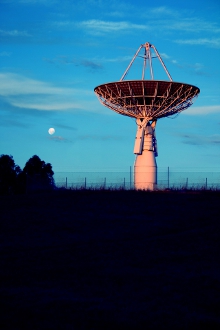A magazine where the digital world meets the real world.
On the web
- Home
- Browse by date
- Browse by topic
- Enter the maze
- Follow our blog
- Follow us on Twitter
- Resources for teachers
- Subscribe
In print
What is cs4fn?
- About us
- Contact us
- Partners
- Privacy and cookies
- Copyright and contributions
- Links to other fun sites
- Complete our questionnaire, give us feedback
Search:
Brain the Size of a Planet
War of the Worlds? Could it happen? Are there Extra Terrestrials out there, watching and waiting, making their plans? Your computer could help find out.

When you go to bed at night your computer doesn't need to sleep, and neither do hundreds of million of other computers all over the world. All that computing power going to waste while you snooze, seems a shame. And that's where a new technology for the 21st century comes into play. It's called GRID computing and it's heading to be the next BIG thing, now that the world wide web is such a part of our everyday lives.
You might have already played with some of the ideas behind grid computing, if for example you've been running the SETI screen saver. SETI (Search for Extra Terrestrial Intelligence) are a group at Berkley in the USA who are trying to find signs of alien broadcasts amongst the stars. Problem is there are a lot of stars, and heaps of data from radio telescopes to work through to find those elusive signals. The solution, a screen saver that pops up when you pop off to have a cup of tea, and uses your computer's unused computer power to search some of the radio telescope data. Like a normal screen saver when you come back refreshed it stops, but perhaps that cuppa could go down in history as your computer finally finds ET!
So that's the idea behind GRID computing, all over the world, connected by the Internet, spare computer power is harnessed together to do big, difficult data processing jobs. GRID software allows you to turn computers in different parts of the world into 'computer clusters' where the software decides what the best way is to distribute and schedule the work over the member computer based on the clusters power and availability, intelligent software running all round the world. There are even plans to be able to charge companies for this service, you let your computer be part for the GRID cluster, and the company pay you for the 'work' your PC is doing.
Who can you trust?
There are lots of interesting issues still to solve, like writing even faster, better GRID software, but also some problems for example with security. Suppose a bank wants to process lots of sensitive financial data on a GRID cluster, that means part of that data will be pumped into your PC, so what is to stop less scrupulous folk taking a peek?
Like all great software projects there are tough technical problems to overcome. But add to this problems associated with different laws in different countries about what kinds of data can be processed and transferred, combined with a need to make it all secure from criminals and you can see this will prove to be an interesting worldwide challenge. It will keep Computer Scientists busy for years; perhaps in the future it will be you who helps to make the GRID happen.
Quick Facts
The Maze

Through a door to the right the room is full of scientists in white coats playing space invaders.

At the end of the corridor you can see a wierd hyper-active bouncing triangle.

Through a door to the left is a room full of computers displaying noughts and crosses games.

Through a grill in the floor you can see someone, scribbling and crossing out, and throwing screwed up pieces of paper into the corner of a dark room.


